Commentary on Mark 1:29-39
Mark 1:21-39 sets up the framework of Jesus’ ministry in terms of casting out demons, healing, and preaching/teaching. We already saw his first exorcism in verses 21-28. Now we encounter his first healing.
Back from the synagogue, a public place for men, Jesus goes into a house, a private place for women. It belongs to Simon and Andrew, the two brothers who were the first recruits in Mark 1:16-18. He comes with a male entourage that includes two sets of brothers, Peter and Andrew and James and John, and is told that Simon’s mother-in-law is in bed with a fever. She is not named, which shows that she was an ordinary woman. Only women deemed important by the Gospel writer are mentioned by name in Mark (see Mark 6:17-29; 15:40; 16:1).
Jesus comes into the house and finds the sick woman. He takes her by the hand and lifts her up (see Mark 5:41). Apparently she is healed right away because she begins to serve them. The word for serving is diakoneo, which denotes not only providing them with food, but also service in general as women did in those days as part of Mediterranean hospitality.
The fact that the first person to be healed in the story is a woman is significant. It shows that from the very beginning Jesus sided with the least of society. But he was a first century Jew and could not escape the mores of his culture. He still expected women to serve him and his group of followers (Mark 15:41), as seen in this case. We should be careful not to make universal laws concerning the role of contemporary women and men based on passages such as this.
The positive message of this healing, and the other cures in Mark 1, is that they represent Jesus’ ideology of inclusion: those healed are incorporated back into society. Simon’s mother-in-law returns to her role as a woman in the society of the time (verse 31) and the leper is told to fulfill his responsibilities as a member of the covenant people (verse 44).
“That evening, at sunset,” in verse 32 has caused scholars of previous generations to accuse Mark of being redundant, and to doubt the role of the evangelist as an author in his own right, relegating him to the role of a mere collector of traditions. That is not the case anymore. Nowadays the majority of biblical scholars think that Mark was the first written gospel and that Matthew and Luke relied on him for most of their information. Therefore, this verse can be explained by saying that the people, by bringing the sick and the possessed at sunset—which marked the beginning of a new day—were respecting the Sabbath sacredness.
As an expert storyteller, Mark makes use of many literary devices, among them hyperboles, as in verse 33: “The whole city was gathered around the door.” But when it comes to Jesus’ ministry, he is more measured and gives a more realistic picture. He says that Jesus cured “many,” not all, as in Matthew 8:16 and Luke 4:40, who obviously had a more exalted view of Jesus than Mark.
Again Jesus does not allow the demons to speak. First, as in 1:25, he does not want them to have power over him. Second, he was afraid that an early recognition of his messiahship would compromise his ministry. He avoided the enticement to popularity, verbalized by Satan in the other versions of the temptation story recorded in Matthew 4:1-11 and Luke 4:1-13, and here by his minions.
Early in the morning, Jesus leaves the house of Simon and Andrew and withdraws to a deserted place to pray. In Mark, Jesus prays three times: here, in 6:41, and in 14:32-42. Prayer is part of Jesus’ profound spirituality and seems to point to moments of crisis in his ministry. When Simon and his companions finally find him (the Greek verb katadioko suggests an intense search), alleging that everyone is looking for him, he tells them that they need to move on to the surrounding towns in order to proclaim the message there too, and to continue his ministry of liberation.
Contextualizing the text
This text offers several considerations for our time:
- We need to avoid the allure of popularity, the celebrity syndrome engraved so deeply in the U.S. culture as exemplified by the widespread use of social media. Jesus could have stayed in Capernaum and become a local hero, using people’s problems for the purpose of self-aggrandizing. But he decided to move on.
- We should accept our limitations. Even Jesus could not heal everybody.
- We need to find our “deserted place” in order to re-energize and charge our spiritual batteries. It is a vital part of our ministry and a good antidote for the cult of personality.
- We need to focus our ministry on those who will not be able to repay us. We should avoid the danger of using their needs as a way of self-aggrandizing. God’s preferential option for the poor is written all over the New Testament and our challenge is how to preach it without using it as a justification for our personal agendas.


February 7, 2021